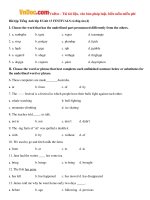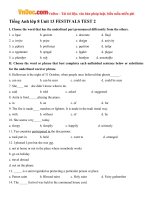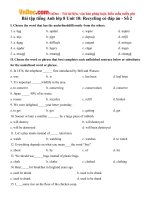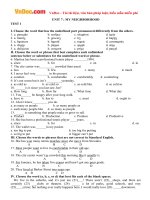Ôn tập tiếng Anh lớp 8 Unit 10 Communication có đáp án
Bạn đang xem bản rút gọn của tài liệu. Xem và tải ngay bản đầy đủ của tài liệu tại đây (197.97 KB, 11 trang )
<span class='text_page_counter'>(1)</span><div class='page_container' data-page=1>
<b>ÔN TẬP TIẾNG ANH LỚP 8 CHƯƠNG TRÌNH MỚI</b>
<b>UNIT 10: COMMUNICATION CĨ ĐÁP ÁN</b>
<b>LANGUAGE FOCUS</b>
Topic
Communication
Phonetics:
Stress in words ending in -ity and -itive
Grammar:
– Review: Puture continuous
– V + to intinitive
Vocabulary:
Communication forms and communication technology
Skills:
– Reading and talking about communication now and in the future
– Listening to and writing about netiquette and emails
<b>PRACTISE</b>
<b>I. Choose a word in each line that has different stress pattern.</b>
1. A. quality B. additive C. decisive D. battery
</div>
<span class='text_page_counter'>(2)</span><div class='page_container' data-page=2>
<b>II. Complete the words under the pictures with -ity or -itive, then mark the </b>
<b>stress syllable in each word.</b>
<b>III. Match the means of communication in the box with the pictures.</b>
cell (mobile) phone computer fax machine letter magazine
</div>
<span class='text_page_counter'>(3)</span><div class='page_container' data-page=3>
<b>IV. Complete the sentences with the words in the box.</b>
conference connecting conversations email online
post share signal telepathy texting
1. I cannot contact her by mobile phone – the network ______is so weak here.
2. We’ll ________an article next week revealing the results of the experiment.
</div>
<span class='text_page_counter'>(4)</span><div class='page_container' data-page=4>
4. We had a video _________yesterday. Mr. Taylors joined us from Australia, and Ms.
Young from Canada.
5. Today there are many different ways to communicate _________ , including social
networking, Chat, VolP and blogging.
6. The supposed process of communicating through means other than the senses, as the
direct exchange of thoughts is called _________ ,
7. Chat and instant messaging programmes allow you to have _________ with your friends
or just write them a quick note.
8. Twitter lets you ___________ brief messages (or “tweets”) with the entire worlds or with
just your circle of friends.
9. The Internet isn’t just about finding information. It’s about _______ with friends, family
and people you’ve never met before.
10. What’s she________ here? I cannot understand this shorthand.
<b>V. Put the verbs in brackets in Past continuous, Present continuous or Future </b>
<b>continuous to complete the sentences.</b>
1. This time tomorrow I (chat)_________ with my cousin in Sydney on Skype.
2. When I (call) ___________ you this morning, my mobile phone was dead.
3. We (have) _____________ a video conference at the moment,
4. People (not send) ____________ snail mail any more in 2040.
5. They (use) __________ signs to communicate with each other at this time yesterday.
6. My brother (not work) __________ in the field of communication now.
7. “I (not text)_________ you at 11 p.m. last Sunday”, said Peter.
8. Mr. Nam (deliver)__________ a speech at the National University at 10.30 a.m next
Wednesday.
</div>
<span class='text_page_counter'>(5)</span><div class='page_container' data-page=5>
10. We (communicate)___________ by using social media in five days’ time.
<b>VI.Use the verbs from the box into V-infinitive or V-ing to complete sentences.</b>
call Chat create keep make
meet post send use work
1.I’ve decided _______a new Skype account.
2. Would you mind_________ me your home address, Mrs. Taylor?
3. Mr. Lam would prefer_________ landline phones for personal calls.
4. I’ve tried __________ her many times, but there have been no answers.
5. Avoid _________personal information on Facebook.
6. I’d like __________a call from my Gmail account.
7. My brother dislikes _________ about politics and religion.
8. They planned __________ in touch with each other by using emails.
9. We don’t like video chatting. We enjoy ________ F2F
10. Tom agreed_________ us at Galaxy Nguyen Du.
<b>VII. Choose the best answer for each of the following sentences.</b>
1. In a message board you can _______ messages or post questions.
A. Raise B. arrive C. text D.leave
2. You shrug your shoulders means” _____
A. I’m happy. B. I don’t know.
C. I’m angry. D. Sorry. I need to go now.
</div>
<span class='text_page_counter'>(6)</span><div class='page_container' data-page=6>
4. I experienced one communication ________ in Japan when I didn’t understand their body
language.
A. Breakdown B. technique C.ability D. device
5. You should try looking for his telephone number on the company_____ as it may be
there.
A. Logo B. email C. website D. forum
6. John managed ______ his family in England by using Zalo.
A. Contact B. to contact C. contacting D. to contacting
7. They advised ________ video chatting in the next meeting.
A. Use B. to use C. using D. will use
8. We________ to have an Internet connection installed in our house next week.
A. completed B. suggested c. admitted D. arranged
9. They ______ about video conferences at this time next Monday.
A. Will talk B. will be talking
C. Are talking D. are going to talk
10. We________ with each other by mobile phone in 2050.
A. Won’t be communicating B. aren’t communicating
C. Haven’t communicated D. aren’t going to communicate
<b>VIII. Fill in each numbered blank with a correct word to complete the following </b>
<b>passage.</b>
</div>
<span class='text_page_counter'>(7)</span><div class='page_container' data-page=7>
Computer, you (3) ________access a library in one country, talk to an expert on a certain
topic in a second country and send your (4)_________ information to someone doing
research in a third. So, we don’t know what will be (5) ____________ in the not-too-distant
future.
The Internet was born (6) __________ scientists attempted to connect the American
Defence Network to other satellite networks in (7) ________ to exchange information.
Soon, scientific and educational institutions as well as research departments became
interested (8)_________ linking up, and, before long, the Internet had expanded into an
international information and communication network. The Internet now (9) ____________
all the countries in the world. You can be connected to the Internet directly through your
own Computer or you can hook up to (10) _________ access system which allows you to
use some of the Internet’ s services.
<b>IX. Read the following passage and choose the best answer for each question.</b>
Telephones help people speak to one another when they are apart. For more than a hundred
years, nearly every telephone was a landline. A landline telephone is one that needs to be
connected by a wire to a network of other telephones. Because of the wires, people could
not take those telephones with them when they left their homes or offices.
What if you had to make a call while you were away from home? You had to find a pay
phone. Paỵ phones are landlines found in public places. Many pay phones are on the Street.
You can make a call from inside a glass or metal space called a phone booth. Once you are
inside the booth, you put coins into a Slot in the phone to make a call.
Telephones have seen a lot of progress. Today, many people carry cell phones. Cell phones
do not need to be connected with wires. They can be used almost anywhere and can fit in an
adult’s hand.
</div>
<span class='text_page_counter'>(8)</span><div class='page_container' data-page=8>
A. A telephone that can be carried around in your pocket and used anywhere
B. A telephone that can be used in a public place
C. A telephone that needs to be connected by a wire to a network of other telephones
D. A telephone that can be used to check e-mail and go on the Internet
2. The article describes an example of a landline. What is an example of a landline?
A. A pay phone B. a smart phone
C. A cell phone D. a mobile phone
3. Pay phones are probably not used as much today as they were in the past. What piece of
evidence supports this conclusion?
A. Many people today carry cell phones, which can be used almost anywhere.
B. Payphones are landlines that can be found in public places.
C. People could not take landlines with them when they left their homes.
D. People put coins into a slot in the pay phone to make a call.
4. What. might be a reason that cell phones were invented?
A. People wanted to be able to make calls from their homes or offices.
B. People wanted to be able to make calls away from home without finding a pay phone.
C. People wanted to be able to speak to one another when they were apart.
D. People wanted to be able to speak and see each other from far distance.
5. What is the main idea of this article?
A. Telephones are used to keep people apart as much as possible.
B. Cell phones are much less useful than landlines and pay phones.
</div>
<span class='text_page_counter'>(9)</span><div class='page_container' data-page=9>
<b>X. Use the words given and other words, complete the second sentence so that it has a </b>
<b>similar meaning to the first sentence. Do not change the word given. (Use 2 – 5 words </b>
<b>in total).</b>
Example: 0. My house has a small garden.
is There__________ my house.
Answer: 0. is a small garden in
1. Don’t miss seeing the Opera House when you are in Sydney.
forget Don’t________ the opera House when you are in Sydney.
2. There will be a discussion about the possibility of using video chatting at this time next
week.
discussing They______ the possibility of using video chatting at this time next week.
3. It’s a pity I don’t have a smart phone now.
wish I _______ a smart phone now.
4. Landline telephones are predicted not to be used in 2030.
using People ________ landline telephones in 2030.
5. I don’t feel like chatting Online at the moment.
prefer I’d___________ at the moment.
<b>XI. Each of the following sentences contains a mistake. Underline it and write the </b>
<b>correct answer in the space provided.</b>
Example: 0. There have four people in our family. 0/ __ are __
1 will Chat with my friend in New York on Skype at this time
next Saturday.
1/_______
2. Peter refused working Online because he prefers meeting face-to-face. 2/_______
3. We are still using landline phones to communicate with each other in 10
years
3/_______
4. She denied sign up for another account to post comments on my
Facebook wall.
4/_______
5. Members of the project are going to have a F2F group discussion in five
days’ time.
</div>
<span class='text_page_counter'>(10)</span><div class='page_container' data-page=10>
<b>ANSWER KEY</b>
<b>I.</b>
1. C 2. D 3. A 4. B 5. C
<b>II.</b>
1. Se’curity 2. Com’petitive 3. Elec’tricity 4. ‘Sensitive 5. Ma’jority
6. ‘positive 7. Natio’nality 8. ‘Primitive 9. ‘Charity 10.
Oppor’tunity
<b>III.</b>
1. Magazine 2. Fax machine 3. Radio 4. Television 5. Pager
6. Computer 7. Letter 8. Newspaper9. Telephone 10. Cell (mobile) phone
<b>IV.</b>
1. Signal 2. Post3. Email 4. Conference 5. Online
6. Telepathy 7. Conversations 8. Share 9. Connecting 10. Texting
<b>V.</b>
1. Will/ shall be chatting 2. Was calling 3. Are having 4. Won’t be sending
5. Were using 6. Isn’t working 7. Wasn’t texting 8. Will be delivering
9. Am getting 10. Will/ shall be communicating
<b>VI.</b>
1. To create 2. Sending 3. To use 4. To call 5. Posting
6. To make 7. Chatting 8. To keep 9. Working 10. To meet
<b>VII.</b>
</div>
<span class='text_page_counter'>(11)</span><div class='page_container' data-page=11>
<b>VIII.</b>
(1) is (2) arrive (3) can (4) own (5) next
(6) when (7) order (8) in (9) reaches (10) an
<b>IX.</b>
1. C 2. A 3. A 4. B 5. D
<b>X.</b>
1. forget to see 2. will be discussing 3. wish I had
4. Won’t be using 5. prefer not to Chat Online
<b>XI.</b>
1. Will chat → will be chatting
2. Working → to word
3. Are still using → will still be using
4. Sign up → signing up
5. Are going to have → will be having
Mời bạn đọc thêm tài liệu Tiếng Anh lớp 8 tại đây:
Bài tập Tiếng Anh lớp 8 theo từng Unit: />
Bài tập Tiếng Anh lớp 8 nâng cao: />
</div>
<!--links-->
<a href=' /> Bộ Bài tập Tiếng Anh lớp 6 Unit 1: Greetings có đáp án
- 23
- 681
- 6








